Aśunyaśayana Vrata
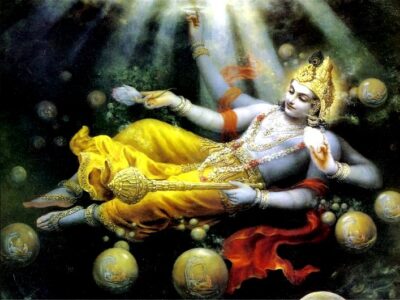 During the Sun’s transit from the Uttarāyaṇ to Aṣāḍī Purṇimā (the full moon of the month of Aṣāḍā), Deveśa Śripati (Lord Nārāyaṇa) retires to his Śeṣa śajyā (bed) to rest and sleep. Soon, one by one, the Gandharvas, the Goddesses and the Deva Mothers retire to their respective bedrooms. Pulastya Muni, upon Maharṣi Nārada’s request, gives a detailed description of the resting procedure of the gods starting from Lord Janārdana, in the Vāmana Purāṇa.
During the Sun’s transit from the Uttarāyaṇ to Aṣāḍī Purṇimā (the full moon of the month of Aṣāḍā), Deveśa Śripati (Lord Nārāyaṇa) retires to his Śeṣa śajyā (bed) to rest and sleep. Soon, one by one, the Gandharvas, the Goddesses and the Deva Mothers retire to their respective bedrooms. Pulastya Muni, upon Maharṣi Nārada’s request, gives a detailed description of the resting procedure of the gods starting from Lord Janārdana, in the Vāmana Purāṇa.
When the Sun is in Mithuna, on Śukla Ekādaśi, Jagatsvāmī Bhagavāna Viṣṇu goes to sleep. So on Dvādaśī, Keśava should be worshipped and offered bhoga, and the Lord should be laid to rest on the great Ananta. On Trayodaśī, Kāmadeva retires to his flower bedecked soft, silky bed. The Yakṣas retire on Chaturdaśi, upon cool beds of golden lotuses. On Purṇimā, Umāpati (Śivā) rests his matted locks unfolded and spread across his tiger skin.
After that the Sun enters Karka, and the cycle of Dakṣināyan commences, heralding the night of the devas. On Pratipat, Brahmā, the One who shows the way, rests upon a blue lotus. Soon after, one by one, the other devas go to sleep. On Dvitīyā, Viśvakarmā, on Tritiyā, Girisutā, on Caturthī, Vināyaka, on Pancamī, Dharmarāja, on ṣaṣṭhī, Skanda, on Saptamī, Bhāskara, on Aṣṭamī, Katyāyanī, on Navamī, Kamalā on Daśamī, the Bhujangas and on Kriṣnā Ekādaśī, the Sādhyas (a sub-group of the Gaṇa devatās) go to sleep. As soon as the devas go to sleep, monsoon descends upon the earth, and the storks and egrets take shelter on mountain tops, while the crows get busy building nests for their pregnant wives.
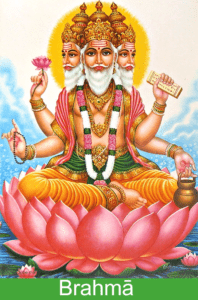
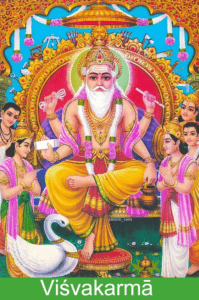
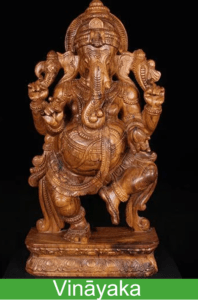
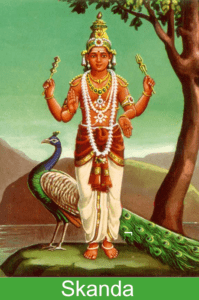
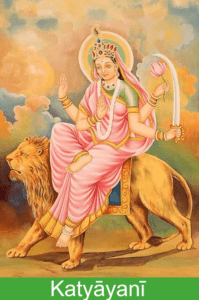
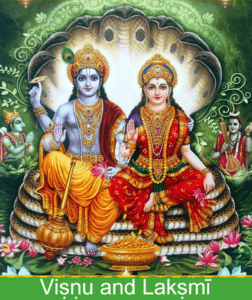 The tithi when Viśvakarmā goes to sleep (Dvitīyā) is considered very sacred, as on that day, Śri Vatsya Caturbhuja Viṣṇu has to be worshipped along with Lakṣmī. Well ripened, sweet smelling fruits should be thrown upon his bed and Madhusüdana should be thus worshipped: “O Ananta, Trivikrama, the way you are eternally united and together with Lakṣmī, in a similar manner, may our beds never remain empty. O Sureśa, the way Lakṣmī has attained aśunyaśayan (she never go to sleep in an empty bed) because of you, O Amitavirya, with the power of that same truth, may our married lives never be destroyed.” After worshipping the Lord in this manner, dine with food cooked without salt and oil. The next day donate fruits to a Brāhmiṇ, saying, “may Lakṣmīdhara be pleased with me.”
The tithi when Viśvakarmā goes to sleep (Dvitīyā) is considered very sacred, as on that day, Śri Vatsya Caturbhuja Viṣṇu has to be worshipped along with Lakṣmī. Well ripened, sweet smelling fruits should be thrown upon his bed and Madhusüdana should be thus worshipped: “O Ananta, Trivikrama, the way you are eternally united and together with Lakṣmī, in a similar manner, may our beds never remain empty. O Sureśa, the way Lakṣmī has attained aśunyaśayan (she never go to sleep in an empty bed) because of you, O Amitavirya, with the power of that same truth, may our married lives never be destroyed.” After worshipping the Lord in this manner, dine with food cooked without salt and oil. The next day donate fruits to a Brāhmiṇ, saying, “may Lakṣmīdhara be pleased with me.”
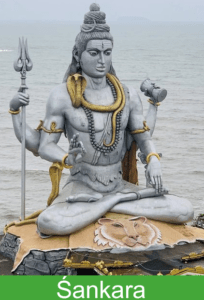 In the month of Śrāvaṇa, if the Kriṣṇā Aṣṭamī coincides with Mṛgaśirā nakṣatra, the tithi is known as Kālāṣṭamī. This is the day Śankara goes to sleep and pervades the universe in liṇga rupa.
In the month of Śrāvaṇa, if the Kriṣṇā Aṣṭamī coincides with Mṛgaśirā nakṣatra, the tithi is known as Kālāṣṭamī. This is the day Śankara goes to sleep and pervades the universe in liṇga rupa.
The four months that the Sun transits from Karka to Vriścika, is to be spend by performing a variety of vratas. Eventually the devas arise one by one. As the Sun enters Tula, Keśava wakes up followed by Kandarpa. On Dvitīyā, Śripati’s idol and bed should be donated.
![]()

0 comments